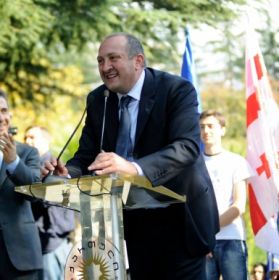Georgia’s October 27 presidential polls were historic and an important step toward strengthening democracy. Outgoing president Saakashvili was replaced through the ballot box by the ruling Georgian Dream coalition’s candidate, Giorgi Margvelashvili. In a remarkably calm and drama-free election, with the lowest voter turnout in a decade at 46.6 percent, Margvelashvili won with 62.11 percent of the vote. Saakashvili was unable to run in the election because of term limits. In addition, the country is now transitioning to a parliamentary republic, which shifts political power from the executive office towards a Georgian Dream coalition-controlled parliament and an as-yet unappointed new prime minister.
 Overview of Results
Overview of Results
The Organization for Security and Cooperation in Europe’s short-term observer mission and other international observers praised the conduct of the elections, saying that fundamental freedoms were respected in a well-administered presidential election. João Soares, the special coordinator for the observer mission, said that “Georgia’s democracy is maturing.”
The final results of the election will be announced on November 15th or 16th, after the receipt of final confirmed protocols by the Central Election Commission (CEC). According to unofficial counts, Saakashvili’s United National Movement (UNM) party’s candidate Davit Bakradze came in second with 21.7 percent of the vote. Populist and fierce Saakashvili critic Nino Burjanadze came in third with 10.2 percent of the vote.
Margvelashvili, former deputy prime minister and education minister, was virtually unknown before Prime Minister Ivanishvili handpicked him to run. He plans to pursue ties with the West while toning down combative rhetoric aimed at Russia. Though Margvelashvili has been criticized for being bland and uncharismatic, he must have won over at least some voters with his unique hobbies.
Results by Demographics
Margvelashvili did especially well in Prime Minister Ivanishvili’s home district of Sachkhere, winning over 94 percent of the district’s vote. He also had high numbers in the mountainous districts of Dusheti and Kazbegi. Second place Bakradze fared relatively better with Georgian soldiers serving in the NATO-led ISAF mission to Afghanistan, overseas voters, and the southwestern Samaskhe Javakheti region, which is noted in part for its high minority populations. Tbilisi mirrored national results, with Margvelashvili getting 62 percent. Third placed Nino Burjanadze’s strongest showing was in the region of Adjara, a former Moscow-backed separatist enclave held by autocratic strongman Aslan Abashidze.
Implications
Margvelashvili’s win reflects the popularity of the Georgian Dream coalition and Prime Minister Ivanishvili, not a personal victory. Policymaking should run more smoothly now that the Georgian Dream coalition controls the presidency and the government.
The results also provided an important boost for the UNM. Bakradze’s showing proves that the now-minority party is still a constructive and legitimate opposition, and his movement to the front indicates a moderate and reconciliatory party that can be cooperative with new leadership. Unfortunately, uncertainty still remains about Saakashvili’s future. While saying he would not imprison Saakashvili, Ivanishvili said the former President may be questioned by prosecutors. Now more than ever, there is an opening for the UNM to rebrand itself, continue to acknowledge its mistakes, and move forward.
As Balazs Jarabik and Jana Kobzova note on the European Council on Foreign Relations blog, Nino Burjanadze’s third place showing despite her outsized campaign financing—more than six times that of the UNM—was likely a letdown for her backers. She is likely to remain in politics, as a convening point for reactionaries.
Prime Minister Ivanishvili has said he pushed for Margvelashvili as an attempt to move Georgian politics away from its “Messiah complex” and encourage voters to support good governance and policy over charisma and popularity. Some observers worry that Ivanishvili plans to maintain influence through his as-yet-unannounced successor and his leading role in the government’s majority coalition, without being accountable to voters when he leaves office.
The new government, while successful on some fronts, such as facilitating a more vibrant media, has not made progress on poverty and unemployment. The challenge for the Georgian Dream coalition is clear: will the new government look forward, particularly on the economic front, or become mired in redressing wrongs of the past?
Laura Linderman is an associate director in the Dinu Patriciu Eurasia Center.
